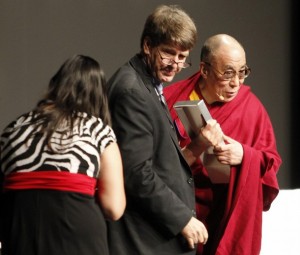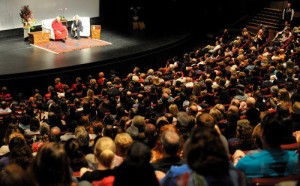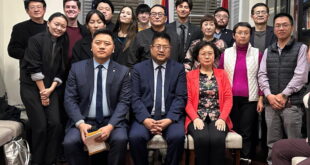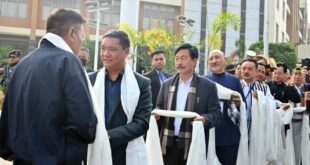On the last day of his current visit to California, on May 4, 2011 His Holiness the Dalai Lama received an award from Amnesty International and spoke at two universities on human rights, compassion and global responsibility.
In the morning he left for Carpenter Performing Arts Center of California State University in Long Beach where members of Amnesty International received him. He first met around 100 activists and made some brief remarks in which he expressed his appreciation of Amnesty’s work.
Thereafter, he entered the stage and was welcomed with great applause by over 1000 guests and members of Amnesty. Ms. Ann Burroughs, former prisoner of conscience from South Africa, made the welcome remarks.
She was followed by Mr. Larry Cox, Executive Director of Amnesty International USA, who gave an overview of the human rights situation and the role AI was playing. He said Amnesty had decided to use the occasion of its 50th anniversary to “honor and celebrate those whose lives and words and actions challenge, inspire and move us to never give up, to continue to do what we can, to grow our nonviolent actions on behalf of the freedom and dignity that belong to each and every individual human being.”

He continued, “There is no more powerful voice for human rights, for peace, and for non violence than the unique voice of His Holiness the 14th Dalai Lama, Tenzin Gyatso. For over a half a century he has, with boundless energy, tirelessly and peacefully defended the rights of people everywhere, while leading the peaceful struggle to defend the right of the Tibetan people to enjoy their own culture, language and religion.”
Talking about the impact of His Holiness, Mr. Cox said, “It is often said that His Holiness is a symbol, a symbol of the power of truth, and non violent action but he is much more than a symbol. He is an example, an example from which all peoples can learn. “
Mr. Cox along with three members of a Amnesty student group presented the first “Shine A Light Award” to His Holiness the Dalai Lama saying, “At a time when people around our world are increasingly and at great risk rising up in the hope of a better world, at a time when his wisdom is needed more than ever, Amnesty International USA is honored to present to His Holiness the 14th Dalai Lama with the first ever “Shine a Light on Human Rights” award.” He said the award, designed by a Tibetan designer and artist, Tenzin Mochoe, is modeled after the title of “Dalai Lama,” which means Ocean of Wisdom. Mr. Cox said, “The ripple represents the scope and reach of His Holiness’ unceasing compassion and the potential of every human being to make a difference in the world.”
In his keynote address, His Holiness said he felt honored to receive the award and recalled that when the Nobel Committee announced the award of its Peace Prize to him, His Holiness had remarked then that personally he was just a simple Buddhist monk, no more, no less, but that the award was a recognition of his small contribution.
His Holiness felt that the world was moving to a positive direction and talked about his conversation with the late Queen Mother in England in 1996. Since she had lived through the 20th century, His Holiness asked her whether humanity was getting better or worse. His Holiness recalled the Queen as saying unhesitatingly that it was moving in a better way saying that in the early part of the 20th century there was not much of awareness of concepts like human rights and self-determination, but that in the latter part of the century these awareness were increasing.
His Holiness said that Amnesty International is one of the sources of inspiration and hope. He said he wanted to thank AI on behalf of the Tibetan people as well as on behalf of the millions of Chinese for taking up their cases. His Holiness likened the work of AI to one of giving the generosity of freedom from fear.
Asking the AI members not to give up His Holiness said that their work did have some impact even among those who did not care about human rights. His Holiness said that the power of force is temporary, but that the power of truth always remained.

Thereafter, His Holiness answered questions from five individuals, including one by Tenzin Dorjee, Executive Director of Students for a Free Tibet, who wanted to know how American students could play a role in bringing peace, harmony, justice and reconciliation to the Tibetan people. In his response His Holiness emphasized on the need to promote closer contact between Tibetans and Chinese and outlined his efforts at reaching out to the Chinese people. Another question was from Mr. Hussam Rafic Ayloush, Executive Director of the Council on American Islamic Relations in Los Angeles who asked for advice on challenging anti-Muslim sentiments and creating a more inclusive society in the United States. His Holiness said the tendency of generalizing the mischievous acts of a few individuals to a whole community was wrong and asked people to know the issue thoroughly before criticizing the community. He talked about his efforts at promoting better relations between Muslims and Buddhists in India.
Another question was by Asif Chowdhury, a gay rights activist, who asked what can the youth do to ensure that all young people, especially those picked on because they appear to be different, feel safe and secure? His Holiness responded that finding a legal recourse was one way. Additionally, he said there was the need for greater understanding and education in moral ethics and concern for others. He jokingly said that some times legal recourse may become more of a problem with people without knowledge or education liable to be manipulated. Here he quoted a Tibetan saying about “Gods turning demons and medicine becoming poison.”
In the afternoon, His Holiness left for the University of California Irvine. He first met with University Chancellor Michael Drake and UC Irvine XIV Dalai Lama Scholars, a group of students who demonstrate knowledge of, academic work and belief in leadership as it relates to ethics, peace and positive national and global relations. Thereafter, His Holiness gave a public talk in the University’s Bren Events Center on Compassion and Global Leaders. His Holiness was introduced by Chancellor Drake who welcomed him back after his 2004 visit. The Chancellor also said that the Dalai Lama Scholarship was being made interntional.
His Holiness addressed the crowd of over 5000 by expressing his appreciation of the Dalai Lama scholars saying this was an indication that his words about educating in compassion were being taken seriously.
His Holiness then talked about the need to develop a calm mind, which was needed to cultivate compassion. He said a calm mind couldn’t be developed when individuals have fear and anger. He said it was related to self-confidence and inner strength. His Holiness then talked about three different ways that could bring about warm heartedness; through a theistic belief of total submission to the will of God; through a non-theistic belief in the law of causality; or through a secular way by promoting secular ethics.
His Holiness said being warmhearted was a criterion of leadership, which also involved being long sighted, full of vision and being practical.
His Holiness then answered a few questions submitted by the audience. These included what would be one change he would choose if he had the capability (His Holiness responded that this was unrealistic) to best way to promote inter-religious harmony. His Holiness talked about four ways to do this; by encouraging discussions among scholars so that they can think about commonality in purpose of all religions; by having meetings among practitioners such as the one he had with the late Trappist monk Thomas Merton that enabled him to have good understanding of Christianity; by having summits of religious leaders like the one convened by the former Pope in Assisi; and by going on group pilgrimages to sacred places of the different religions.
His Holiness then went to address a youth summit that involved bringing together youth for positive service to the community. The session began with a special music titled Diversity composed in honor of His Holiness by a nine-year old piano prodigy Emily Bear.
In his remarks, His Holiness said he was happy to see young boys and girls actively involved in compassionate activities. His Holiness talked about the youth being those who will direct where the 21st century heads as he and some of the others gathered belonged to the 20th century.
His Holiness said much of the tragedy in today’s world is on account of emphasis on secondary values like nation and religion instead of having a global outlook. He called for the need to inculcate a feeling of global responsibility and to incorporate teachings in moral ethics in the education system.
During the Question & Answer session His Holiness was asked about his feeling regarding the fact that there was celebrations at the death of Osama Bin Laden. He responded that it would depend on the perspective. He said from a Buddhist perspective of your enemy being your greatest teacher, it was sad. But for those who believed in the enemy being the absolute enemy they would have a different perspective.
Among participants in this session included Will.I.Am from the musical group The Black Eyed Peas, World Surfing Champion Kelly Slater, and some others. His Holiness’ next program is in Minnesota.



